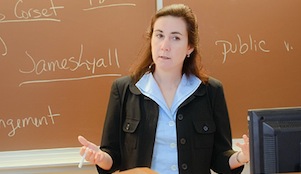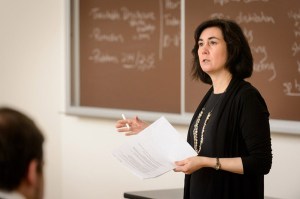
Kara Swanson in the Press

She Pioneered the Sale of Breast Milk, Then Lost Everything
“They are saddened by the idea that this product that they believe in very strongly and think would benefit a lot of babies would be less accessible if allocated on the basis of company profit rather than patient need,” says Kara Swanson, a law professor at Northeastern University and the author of “Banking on the Body.” “In […]

How This Unsung Black Entrepreneur Changed The Food Industry Forever—And Made A Lot Of Dough
It’s the framework that explains why “Black Americans were always inventing,” adds Kara W. Swanson, a law and history professor at Northeastern University. But proper ownership was hard to come by. “Many sold the rights to white men in part because they didn’t have the money to develop or because they were worried that people […]

For Black Inventors, Road to Owning Patents Paved With Barriers
The diversity gap in the patent system has “deep historical roots,” Northeastern University law professor Kara Swanson said.

The new gene tool crisper sparks a history war
When it comes to science and technology, there has long been a tension between the desire to single out an individual inventor and the reality that breakthroughs usually result from an incremental, collective process. “Science likes origin stories,” says Kara Swanson, a law professor and historian of science at Northeastern University.

Organ banking: from impossible to slightly less impossible
And many working to address organ shortages are skeptical about shifting resources toward science and tech research. Organ banking could raise new ethical questions. According to Northeastern University law professor Kara Swanson, who’s written about the legal debates behind the property of the human body, the ability to begin banking organs will probably raise debates on […]
Slate
Egg-freezing parties aren’t like tupperware parties
The latest trend in assisted reproduction is egg-freezing parties, sales events often described as the “new Tupperware parties.” In the I Love Lucy era, Tupperware parties were a marketing breakthrough that made Tupperware plastic storage containers wildly successful. Hosting parties offered women a way to earn money at a time when Rosie the Riveter was […]

Banks of blood and sperm
The word “bank” typically refers to financial institutions, large and small, from the storefront where you go to cash your checks to the big investment firms of Wall Street. Yet there is a class of banks that deals not with money but with bodily fluids—blood, sperm, and breast milk. These “banks” aren’t part of our […]

Blood, sperm, milk: The thriving market in human body products
Americans have a nearly insatiable demand for blood. Every two seconds, someone in the country requires a blood transfusion. And to get one they go straight to a blood bank. But it’s a strange idea. A blood bank. Or a sperm bank. Or a breast milk bank. What kind of bank relies on donations? That’s […]

The trouble with organ banking
After last year’s Boston Marathon bombings, many people rushed to donate blood—so much that the Red Cross, in a statement the next day, said it had more than it needed. An adequate blood supply is something most of us now take for granted: Thanks to altruistic donors, we assume that, if we end up in […]
Slate
The surprisingly engrossing history of patent examiners
I once silenced a seatmate on a transatlantic flight who threatened to be overly chatty by (truthfully) telling him that I was traveling to London to speak about the history of the patent examiner. Horrified I might tell him about it, he quickly returned to his own, apparently more interesting reading. One glance at the […]

